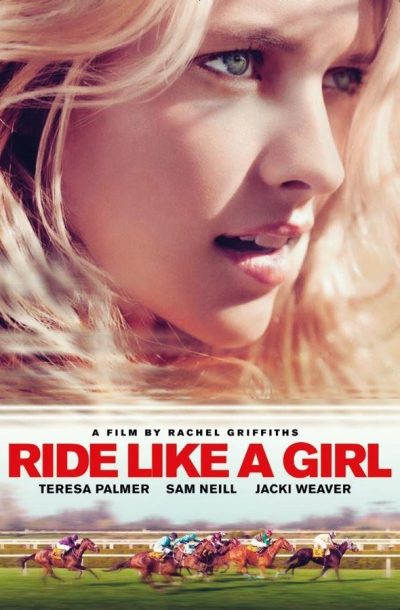★★½
“Trots, when it should gallop”
 This opens and closes with footage and photographs of the real Michelle Payne, who is the subject of the film. Part of me wonders if that documentary approach might have proved a more successful one, rather than the parade of sports drama cliches we get here. Admittedly, quite a lot of them are based in fact. Payne was the first woman to ride to victory in the Melbourne Cup – that’s Australia’s premier horse-race, roughly equivalent in prestige to the Kentucky Derby or Grand National in the US or UK respectively. This alone, is quite an achievement. But she did so as one of ten brothers and sisters, who largely had to bring themselves up after their mother died when Michelle was only six months old. Her father was a horse trainer, and no fewer than eight of his offspring became jockeys, including Michelle of course.
This opens and closes with footage and photographs of the real Michelle Payne, who is the subject of the film. Part of me wonders if that documentary approach might have proved a more successful one, rather than the parade of sports drama cliches we get here. Admittedly, quite a lot of them are based in fact. Payne was the first woman to ride to victory in the Melbourne Cup – that’s Australia’s premier horse-race, roughly equivalent in prestige to the Kentucky Derby or Grand National in the US or UK respectively. This alone, is quite an achievement. But she did so as one of ten brothers and sisters, who largely had to bring themselves up after their mother died when Michelle was only six months old. Her father was a horse trainer, and no fewer than eight of his offspring became jockeys, including Michelle of course.
In this version, Palmer plays the heroine, with Neill the ever-tolerant father attempting to steer her career. It’s not easy, with Michelle having to deal with a racing establishment that still doubts women can be as good jockeys as men, before eventually convincing owner Darren Weir (Stapleton) to give her a chance. She also has to come back from an fall that left her with a fractured skull and bruised brain. Then, she almost lost the opportunity to ride her horse, Prince of Penzance, in the big race after being suspended for racing tactics perceived as dangerous, fairly or not. In other words: basically checking off all the obvious impediments, and the film adds little or nothing of note to them, though some of the racing footage is effective enough. [The film, probably wisely, glosses over post-Cup events. Prince of Penzance went lame and had to retire; Weir was charged with cruelty to animals; and Payne got another suspension for amphetamine abuse. Oops]
It works better when it’s remaining grounded, in a way only Australians can be. Neill does a good job of that as the long-suffering father, and it’s a shame he all but vanishes from the second half of proceedings. It does offer amusing moments like watching a posse of nuns (or whatever the collective term is for them!), marching into a bookmakers on Melbourne Cup Day to bet on Payne and her pony. Much credit is also due to the film-makers for letting Payne’s real-life brother, Stevie, who has Down’s Syndrome, play himself in the movie. But it does suffer from what is likely an inevitable problem given the source material: we know how it’s going to end, and how it’s going to get there as well. Given this, taking a few more risks with the approach or the portrayals of the characters might have been warranted. Instead, Griffiths seems intent on taking the safest route she can find between plot-points which are largely obvious. The results are, as you’d expect, little more than feel-good fodder.
Dir: Rachel Griffiths
Star: Teresa Palmer, Sam Neill, Sullivan Stapleton, Stevie Payne




